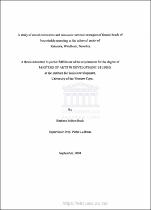| dc.contributor.advisor | Le Roux, Pieter | |
| dc.contributor.author | Seibes-Bock, Barbara | |
| dc.date.accessioned | 2023-02-23T08:33:19Z | |
| dc.date.available | 2023-02-23T08:33:19Z | |
| dc.date.issued | 2004 | |
| dc.identifier.uri | http://hdl.handle.net/11394/9624 | |
| dc.description | Magister Artium (Development Studies) - MA(DVS) | en_US |
| dc.description.abstract | This exploratory study investigated the survival strategies, needs, problems, coping mechanisms, possible solutions and future prospects of the female heads of households who lived and operated in the informal sector in the Damara suburb in Katutura, Windhoek. A questionnaire with both closed (quantitative) and open ended (qualitative) questions were administered to 30 female heads of households by the researcher in face to face interviews after snowball sampling. The questions covered three main categories: personal information on the heads of households, the types of business activities they were involved in and their household situation. The quantitative data collected were analysed using the Statistical Package for Social Sciences (SPSS) and Microsoft Excel. A striking feature was that the vast majority of the female heads of households interviewed formerly employed as domestic workers, with low social status and poor living and working
conditions. Their opportunities in the formal sector were severely limited due to their low qualifications. About 7O%o of the heads of households interviewed were engaged in retail trading businesses: selling of mostly cooked foodstuff, various small grocery items, trading
beverages and liquor. They earned, on average, N$10-50 (Namibian dollar) per day, from which they covered their household expenses on a day-to-day basis and bought stock in small quantities to resell. Only a small number of women used unique skills to generate an income: dressmaking (13%) and providing services (10%). The women who sold liquor generated more income than women in the other categories. The major common problem reported was a lack of money and stock, followed by food shortages, indebtedness and child discipline. The study also used the following three theories to discuss and describe how women operating in the informal sector were affected by the principles of the said theories. The IMF World Bank neo-liberal approaches required Government to cut back on social spending to create wealth through economic growth. Since the informal sector activities took place outside the mainstream economy, those measures did not benefit these heads of households. Marxist theory explained how class structures contributed to women's poverty, while the theory on feminisation of poverty explained how women in particular bear the burden of poverty more than men do. | en_US |
| dc.language.iso | en | en_US |
| dc.publisher | University of the Western Cape | en_US |
| dc.subject | Quantitative | en_US |
| dc.subject | Qualitative | en_US |
| dc.subject | Statistical Package for Social Sciences (SPSS) | en_US |
| dc.subject | Microsoft Excel | en_US |
| dc.subject | IMF/World Bank | en_US |
| dc.subject | South West Africa People's Organization (SWAPO) | en_US |
| dc.subject | Social Sciences Division (SSD) | en_US |
| dc.title | A study of social constraints and economic survival strategies of female heads of households operating in the informal sector of Katutura, Windhoek, Namibia. | en_US |
| dc.rights.holder | University of the Western Cape | en_US |

